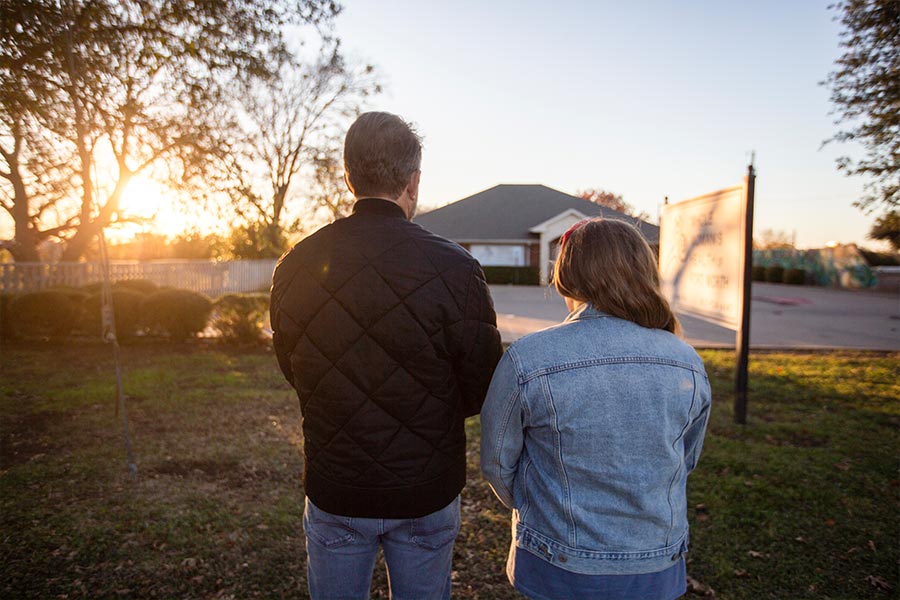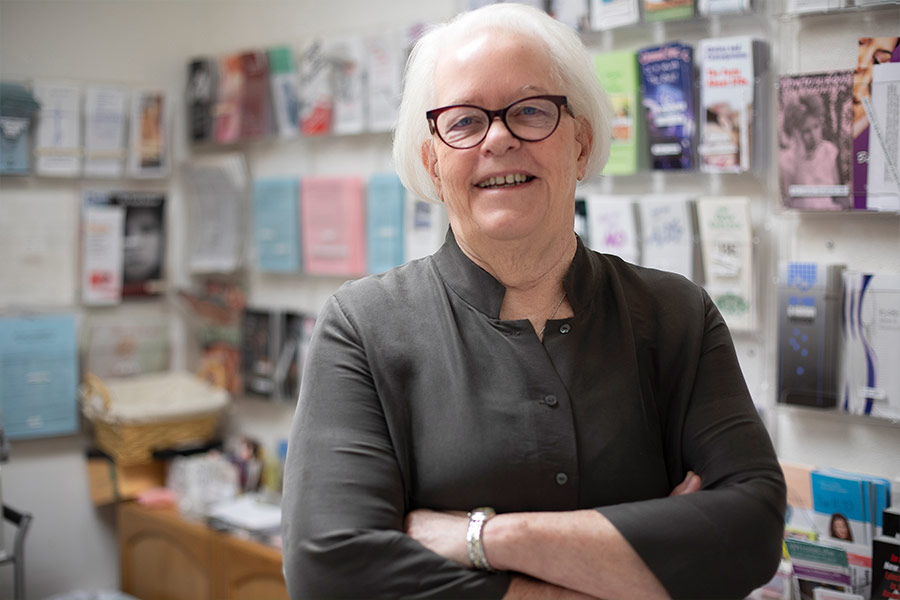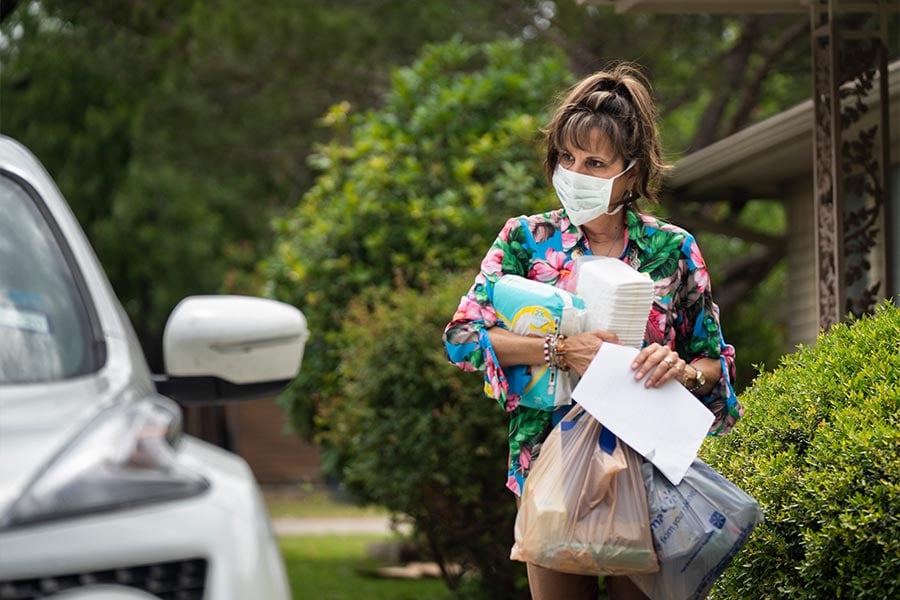There's more to life: pro-life ministries debunk the pro-birth myth
Pro-birther.
Like most labels, it’s incomplete at best. In the case of pro-life ministries in the Diocese of Fort Worth, it’s counterfactual.
The word “pro-birther,” a derogatory term describing someone opposed to abortion, assumes that those who advocate for the right to life will then ignore the needs of the mother or the infant after his birth.
The pro-birth term gained national attention during a 2004 interview between journalist Bill Moyers and Benedictine Sister Joan Chittister, where she emphasized the importance of extending support to children and families throughout a lifetime.
She said, “I do not believe that just because you are opposed to abortion, that that makes you pro-life. In fact, I think in many cases, your morality is deeply lacking if all you want is a child born but not a child fed, a child educated, a child housed. And why would I think that you don’t? Because you don’t want any tax money to go there. That’s not pro-life. That’s pro-birth. We need a much broader conversation on what the morality of pro-life is.”
Accusations of the Catholic Church being pro-birth, not pro-life, have reverberated for years. This fall, during her nomination process to become a Supreme Court justice, Amy Coney Barrett was labeled pro-birth, despite the fact that she has adopted two children.
Labelling individuals, or the Church, as pro-birth is an attempt to deflect attention from two important matters — the ugly reality of abortion and the teaching and ministries of the Church.
“In my mind, [pro-birth] is a ridiculous assertion to distract from the truth of the issue and the situation,” said Terri Schauf, Respect Life coordinator for the Diocese of Fort Worth. “Honestly, pro-lifers are the most generous and loving people I have come across. The pro-life people that I know are helping at pregnancy centers, donating food, helping people at the border. The list goes on and on.”
But what about?
One criticism that detractors express about the pro-life community is that they do not respond to every human rights violation, which Schauf describes as an absurd standard. Naysayers ask questions such as “Why aren’t you solving the crisis in Nicaragua?”
Calling on pro-lifers to solve every humanitarian struggle is not just an absurd standard, but a double standard. Schauf gives the example of her brother-in-law, who has participated in fundraisers for ovarian cancer since his mother died of the disease. “They are not against him for not raising funds for breast or prostate cancer,” she said.
Bobby Warren, Fort Worth campaign coordinator for 40 Days for Life, has spent years on the front lines praying at abortion clinics. He has heard similar complaints, such as “Why aren’t you building houses?” He called it an unrealistic and “onerous expectation to say that if you are truly pro-life you have to do a myriad of other things.”
He continued, “We all give our time, our treasure, and our talent in many ways, and we don’t have time to participate in every ministry.... There is singleness in purpose in ministry, and there must be to be effective. You can’t be spread so thin that you can’t focus on the mission at hand.”
Warren and his family focus on pro-life ministries year-round, from sidewalk prayer to delivering furniture for moms in need.

Bobby Warren and his daughter Esther pray outside an abortion clinic in west Fort Worth. (NTC/Rodger Mallison)
Come and see
To counteract the pro-birth claim, critics need to understand the scope and the specifics of what happens in pro-life ministries, according to Schauf. A lack of knowledge, perhaps willful, fuels the disparaging comments about pro-lifers disregarding mothers and their babies after birth.
She encouraged Catholics, as well as their criticizers, to get acquainted with the many pro-life ministries in the diocese.
The first example Schauf cited was surprising: Rachel Ministries, which helps women and men heal from the emotional and spiritual pain of abortion.
She explained, “If we were truly only pro-birth, we would ignore any woman who has had an abortion. We would have no desire to help her. That’s not the case. When the choice has been made, the Church is still there. There is outreach for women who have regret and want to seek God’s mercy after an abortion.”
God’s mercy and compassion are also offered to the women entering abortion clinics.
When sidewalk counselors have the opportunity to interact with women entering the clinic, Warren said they “listen to her situation and understand where a person is coming from. Then provide feedback, and hope, and options, and choices for that person beyond abortion.”
Warren said that sidewalk counselors may only have five seconds to communicate to the women that “We can help you. You have resources, you have options.”
If an abortion-minded woman leaves the clinic and goes to a pregnancy center instead, she will be surprised at the options and quantity and quality of resources provided.
Crisis solvers
A long-established pro-life pregnancy center, Mother and Unborn Baby Care has been helping women with unplanned pregnancies for 36 years.
Pat Pelletier, president of Mother and Unborn Baby Care and wife of its late founder, Chuck Pelletier, said that many women come to the center seeking abortion, and about 90 percent of those women change their minds.
She has learned by talking with these women, “There’s always a crisis that’s put her in that position. But it’s generally not the baby that’s the crisis. It’s financial, or it’s lack of support from the parents or the guy who’s the dad. She’s being pushed into this,” Pelletier said.
Other people in the pregnant woman’s life may tell her “She’s too young, she’s too old, she has too many kids, whatever. The baby within her is not causing that problem right now. There’s no added expense. So, if you can eliminate the crisis — if you can identify it and work with her and eliminate the crisis...we’re not eliminating the baby,” Pelletier continued.
Pelletier laughed at the accusation of being a pro-birther. “Every pregnancy center that we know of offers help all the way through with whatever they need. Food, clothes, bills paid, whatever.”
Like other pregnancy centers, Mother and Unborn Baby Care helps pregnant women tap into community resources for adoption referral or services and needs beyond what the center can provide.
Pelletier explained, “That’s the difference between the pregnancy centers and abortion clinics. If she walked into an abortion clinic and found out she was pregnant and decided she didn’t want to have an abortion, there’s not going to be any free diapers, there’s not going to be a crib, there’s not going to be a support system, there’s not going to be a ‘Let us help you through this. What’s the crisis?’ There’s going to be ‘$650 and we will eliminate the baby and you can go on.’”

Pat Pelletier, president of Mother and Unborn Baby Care, estimates the center has saved more than 9,000 lives. (NTC/Rodger Mallison)
Information age
At Mother and Unborn Baby Care and other pro-life pregnancy centers, when a pregnant mother sees the reality of the baby in an ultrasound and learns about the resources and support available, she often reaches a turning point in her decision to have the baby.
With a new baby on the way, the prospective mother may need more than diapers, wipes, and baby gear.
Several pregnancy centers, such as Loreto House in Denton and Flourishing Tree in Aledo, offer pregnancy, childbirth, and parenting classes in a learn-to-earn format.
Loreto House has about 140 class curriculums for a woman’s first trimester of pregnancy until the child turns three, getting parents through the challenges of potty training and temper tantrums. It’s not uncommon for mothers to return during their second and third pregnancies.
By attending information classes (or Mass or Bible study, in the case of Flourishing Tree), mothers and fathers earn points that they exchange for diapers, baby items, and even baby furniture and strollers.
Alicia Lopez, a member of Immaculate Conception Parish in Denton, has attended dozens of these sessions.
With her family a few states away, Lopez came to Loreto House three months pregnant and looking for resources and education.
The hospitality that Loreto House prioritizes made Lopez feel comfortable right away. “Everyone is so happy to see you, and they are so welcoming. It’s like going to a friend’s house,” she said.
Lopez thinks the knowledge she’s gained through parenting classes have helped her be a better mom to her 2½-year-old son, Luka.
Plus, by taking the classes she has earned diapers, wipes, and other supplies, which helped the family as they adjusted to living on just her husband’s income.
She has especially appreciated the support of Loreto House during the coronavirus pandemic. Although classes are taught remotely, her counselor and prayer companion check in by phone. Lopez said, “Having those ladies there that really care about what’s happening in our lives has meant the world to our family.”

Marjorie Looney, an advocate at Loreto House, emphasized that their support does not end when the baby arrives. She said, “We don’t stop when the baby’s born. Our guests, they know we add an extra layer of support for them. We are here for them just as much as they possibly need.”
Looney explained that the pregnancy center treats their guests with respect, compassion, and dignity to help the mothers realize their own worth and inner strength. Through material, emotional, and spiritual support, “We set them up for success.”
According to Looney, the pro-abortion community message tells a mother she’s not strong enough to handle being a mother. Their message is “If you get it taken care of, then life will be better. That’s such a lie that young women think is true,” she said.
In her four years at the center, Looney has come to see that often “We save the life of that child, but we save the life of that mother, as well.” Some mothers return to Loreto House years later and report that by choosing life for the baby, they chose life for themselves and stopped making bad choices. The support and resources of the pregnancy help center serve as a springboard for the rest of their lives.
Located in Aledo, Flourishing Tree family pregnancy resource center also offers assistance to women in an unplanned pregnancy. But executive director Roxanna Young will listen to anyone who needs help from any location.
They have assisted mothers and fathers from eight counties, but Young is open to whoever calls, including those from outside the county, state, and even other countries. She taps into a network across the country and all over the world that can provide resources to struggling expectant mothers and families.
“We don’t just serve [North] Texas; we are able to help all over,” she said.
Now in its fourth year, the center is young, growing, and “learning,” according to Young. “We’re learning in the sense of where God wants us to help and what He wants us to do. The Lord brings them to us,” and they were able to help 67 clients in October.

Flourishing Tree executive director Roxanna Young provides baby items with drive-thru service. (NTC/Juan Guajardo)
Although primarily a resource for expectant mothers and young families, “We help whoever comes, and God gives us what we need to have,” she said, listing examples of donations of older children’s clothing or adult diapers arriving shortly before the items were requested.
In addition to material needs, a licensed counselor, lactation consultant, and nutritionist provide educational, emotional, and spiritual support.
Parishes pitch in
Pregnancy centers aren’t the only source of relief for pregnant women through their crisis and beyond.
Currently, 23 parishes in the Diocese of Fort Worth offer Gabriel Project, a ministry that pairs a Gabriel Angel with a woman in an unplanned pregnancy for emotional and spiritual support, as well as some baby items. The Gabriel Angel walks with the mother through her pregnancy until the toddler is 18 months.
About 70 women have been trained as Gabriel Angels, and additional volunteers help with other tasks like delivering furniture. In the third quarter of 2020, 279 mothers were served.
Angela Walters has been the Gabriel Project coordinator since 2004. She explained that although they can assist or refer mothers with financial needs, “our whole mission is spiritual and emotional support. Not only do we want them to choose life for this baby, but we want to walk with them until they are on their feet, until they are out of their crisis, until they can make different choices. We are trying to point them in the right direction for the future.”
Gabriel Project is a program of Catholic Charities Fort Worth, and many women transition to long-term case management afterwards. Walters said case management encourages women to develop a five-year plan and pairs them with a social worker in order to achieve that plan. After about two years, the family is self-sufficient and off government assistance.
The pro-birth claim isn’t valid, according to Walters. “We’re not just here for the baby itself. We’re here for mom to get on her feet, to get out of a crisis — almost two years, walking with her. Beyond that, to help her get into long-term case management with Catholic Charities.... What we’re doing is to teach her how to take care of herself and her baby, hopefully. We can’t claim 100 percent success, because it takes the mom to do it, too.”
Far from reality
In his many years in pro-life, Bobby Warren has observed pro-life ministry sometimes take on unexpected forms, like helping raise a credit score, career planning, and life-skill counseling.
Pro-life ministry, said Warren, is “just not what people think. It’s just not pro-birth.... There’s so much more going on.... It debunks the pro-birth term. Seeing all this around me, I just really scratch my head with that term. It couldn’t be further from the reality of the pro-life work being done in this diocese and around the country.”
He continued, “I think it’s a non-existent group that they are describing, and it’s used to divert attention away from the truly spirited and zealous way that people approach the issue of defending the unborn.
“I would ask people who feel that way to come out and test the water. If they are truly interested in pro-life work, if they are truly interested in what happens from conception to birth and after birth, and see how we care for those lives, come on out. You will quickly see that pro-birth is someone else’s term. It’s not what happens in pro-life work.”
Editor's Note: Roxanna Young was incorrectly identified as the founder of Flourishing Tree in the January/February 2021 issue of the North Texas Catholic. Young is the pregnancy center's executive director. This article reflects that correction.
